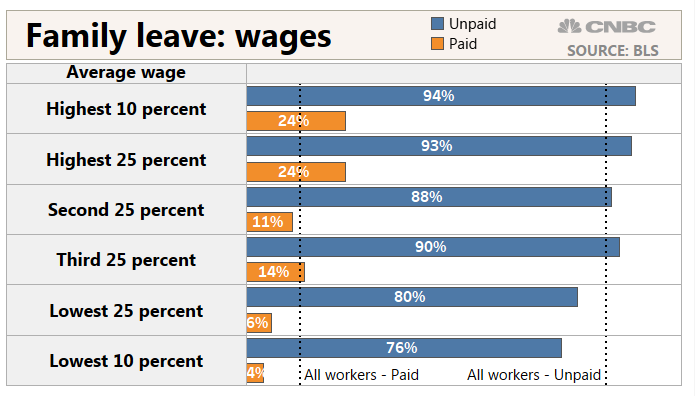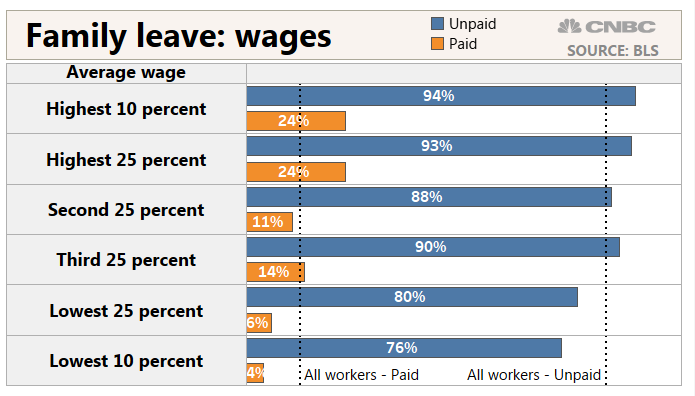Senate Republicans are pushing a new way for families to access paid leave when they have a child.
But in order to take time off, parents must be willing to take their Social Security retirement benefits a little later.
Sens. Joni Ernst (R-Iowa) and Mike Lee (R-Utah) unveiled the plan, called the CRADLE Act, on Tuesday. Under terms of the proposal, new parents would be able to take anywhere from one to three months of paid leave, as long as they agreed to postpone the start of their Social Security retirement benefits.
It's not the first time paid family leave and Social Security benefits have been tied together. Last year, Sen. Marco Rubio (R-Florida) also pushed a family leave proposal that would require parents to delay taking their retirement benefits down the road.

The proposals come as paid parental leave policies are gaining broader support, including from President Donald Trump, who touted the proposed benefits in the White House budget released this week. Democrats in Congress have also pushed their own version with the FAMILY Act, which was reintroduced in February.
"The U.S. is one of the few countries that doesn't have paid family leave, and it's clearly a need and can often cause families hardship around the time of a birth," said Melissa Favreault, senior fellow at the Urban Institute, a non-partisan economic and social policy research organization.
How it would workUnder the CRADLE Act, parents would be required to notify the Social Security Administration that they plan to take paid parental leave benefits.
That written notice would have to be submitted to the agency between six months to one month before a new child is expected to arrive, either through child birth or adoption. At the same time, applicants would be expected to give their employers 30 days' written notice.
Other rules would apply, including that applicants must be citizens or permanent residents. In addition, individuals must have a qualifying work record. That includes having worked four out of four, or five out of six, of the most recent quarters. Individuals who have worked for at least 20 quarters in total could also receive benefits.

Under the plan, parents could elect to take one, two or three months off. The amount of benefits they would receive during that time would be calculated based on Social Security's current disability formula, which generally provides a higher payout on your current work history compared to calculations for retirement benefits.
For every month of paid parental leave they receive, their retirement benefits would be postponed by two months.
The plan is aimed at being budget neutral, meaning that it would not detrimentally affect Social Security or the national debt.
Why it could workIf this debate gets additional traction, it could help inspire a broader Social Security discussion that's long overdue, said Joe Elsasser, president and founder of Covisum, a provider of Social Security software.
That is because there's speculation Social Security may not be on a stable, long-term footing financially, Elsasser said. The trust funds which help pay for retirement and disability benefits are projected to run out of cash reserves by 2034.
Even without any changes, the system would still be able to pay more than 70 cents on every promised dollar, Elsasser noted.
show chapters Santelli Exchange: Social Security and Medicare's downward spiral 11:59 AM ET Fri, 22 June 2018 | 03:10
Santelli Exchange: Social Security and Medicare's downward spiral 11:59 AM ET Fri, 22 June 2018 | 03:10 Some states have or are developing policies to address paid family leave. The question is whether it would make sense to tie Social Security to this issue.
"It's probably very reasonable," Elsasser said. "They're already paying benefits.
"The mechanics of supporting programs like this are generally in place."
Addressing family leave on a federal level would eliminate the need for employers to have to deal with a patchwork of different rules from various states, Elsasser said.
Who could be vulnerableLike most policies, the plan would not benefit all workers equally, which means that some families could be vulnerable, Favreault said.
Taking money now and having to delay benefits later would essentially work like a loan — and one that many individuals can't be sure they'll be able to pay back until they reach that life stage, Favreault said.
While some people may be able to afford to wait a couple of months to take their benefits, others may have to still take them at their earliest eligibility age. That would result in them having reduced benefits for the rest of their lives, Favreault said.
More from Personal Finance:
Trump touts paid family leave in budget; taxpayers worry
Why secret cash nanny payments could backfire on taxes
Money moves to make now before your new baby arrives
These risks could be higher for families who have multiple children, and therefore take leave multiple times — further pushing off their retirement benefits.
The discussion could also broaden out to include other proposals, such as using Social Security deferrals to help pay off student loans.
"I worry about the precedent of opening up that piggy bank that so many people rely on in their retirement," Favreault said. "Any one thing that's small, you can make that argument that that's not dangerous.
"You could be opening up a Pandora's box."
No comments:
Post a Comment